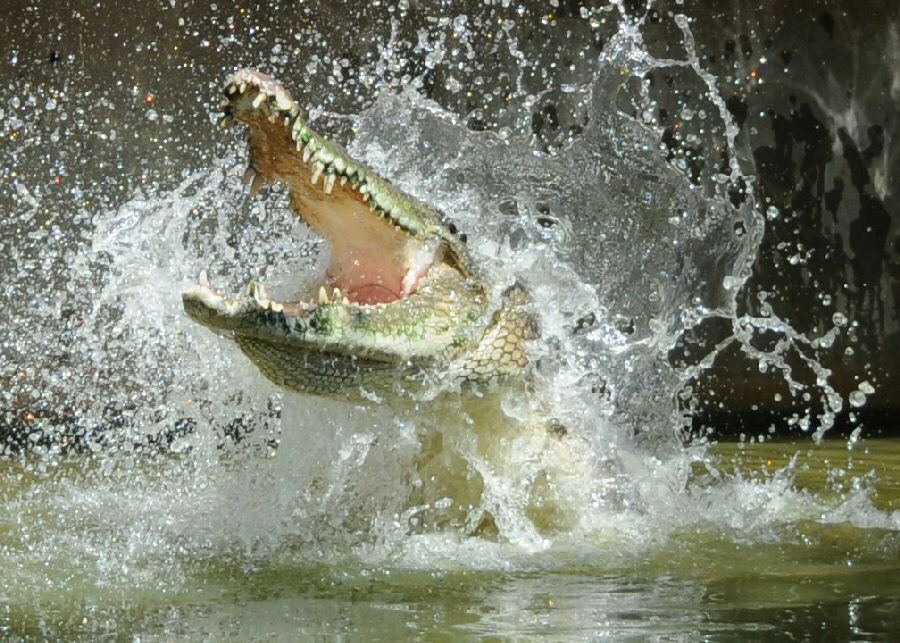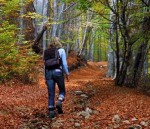 One of the first things we are taught as children is to be mindful of traffic. We know all too well the consequences of running across a busy street; doing so with blatant disregard would be considered suicide. Therefore, it is well established that roadways are the automobiles area, and we respect that. So why don’t we give the same caution in regards to wildlife? Why would we dare swim in crocodile territory in North Queensland, Australia? Why would we hike through Grizzly bear habitat without taking extreme precaution? Or why would we walk within meters of a wild elephant herd in Kenya just to get a better look? It certainly doesn’t take a genius to deduce the end result of such interactions, but yet we do them anyway. Are humans victims of the “It will never happen to me” syndrome, or are we simply not aware of the risks involved?
One of the first things we are taught as children is to be mindful of traffic. We know all too well the consequences of running across a busy street; doing so with blatant disregard would be considered suicide. Therefore, it is well established that roadways are the automobiles area, and we respect that. So why don’t we give the same caution in regards to wildlife? Why would we dare swim in crocodile territory in North Queensland, Australia? Why would we hike through Grizzly bear habitat without taking extreme precaution? Or why would we walk within meters of a wild elephant herd in Kenya just to get a better look? It certainly doesn’t take a genius to deduce the end result of such interactions, but yet we do them anyway. Are humans victims of the “It will never happen to me” syndrome, or are we simply not aware of the risks involved?
Entering into crocodile territory is not something to be taken lightly. Whether it is the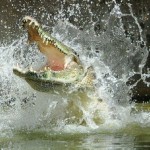 saltwater croc of North Queensland, the Mugger of India, or the Nile croc in the Mara River, all adult crocodiles have the capacity to kill and eat humans. Although not extremely common, crocodile confrontations humans do happen, and garner international press coverage when they do. It has been well documented that crocs are ambush predators; striking hard and fast at the water’s edge. So why do we tempt fate? And to add insult to injury, once a person is bitten or killed all crocodiles within close proximity are sentenced to death. Where exactly is the justice in that?
saltwater croc of North Queensland, the Mugger of India, or the Nile croc in the Mara River, all adult crocodiles have the capacity to kill and eat humans. Although not extremely common, crocodile confrontations humans do happen, and garner international press coverage when they do. It has been well documented that crocs are ambush predators; striking hard and fast at the water’s edge. So why do we tempt fate? And to add insult to injury, once a person is bitten or killed all crocodiles within close proximity are sentenced to death. Where exactly is the justice in that?
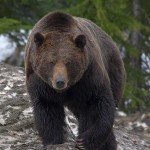 Regardless if it is a crocodile, grizzly, or elephant, I find it hard to believe that humans do not fully understand the risk. But, playing devil’s advocate, maybe it is possible that people do not understand that wild animals are not held behind protective barriers like those seen in zoos. Or maybe we have become complacent and view wild animals similarly as we do our domestic dogs and cats. Nevertheless, I think humans could definitely use a refresher course on how to interact with nature.
Regardless if it is a crocodile, grizzly, or elephant, I find it hard to believe that humans do not fully understand the risk. But, playing devil’s advocate, maybe it is possible that people do not understand that wild animals are not held behind protective barriers like those seen in zoos. Or maybe we have become complacent and view wild animals similarly as we do our domestic dogs and cats. Nevertheless, I think humans could definitely use a refresher course on how to interact with nature.
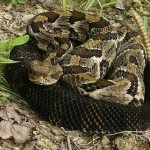 Teaching small children to respect wildlife is the first place to start. Please note that I said respect and not fear. In more cases than not, people are injured and killed not from running away from potentially dangerous interactions with wildlife, but when they are trying to kill it because they are afraid. I assure you from my work with the Timber rattlesnake, the only thing this snake wants to do when it interacts with people is to move away. In the United States, over 70% of all rattlesnake envenomations involve males between 18 to 45 years of age and alcohol. In addition, it is when people try to get close enough to harm the snake that they are bitten. For example, instead of telling kids that rattlesnakes are bad, teach them how this particular species helps the environment by controlling rodent populations and subsequent diseases transmitted by rodents. Show children the beauty of wild creatures and how they should always be enjoyed at a safe distance.
Teaching small children to respect wildlife is the first place to start. Please note that I said respect and not fear. In more cases than not, people are injured and killed not from running away from potentially dangerous interactions with wildlife, but when they are trying to kill it because they are afraid. I assure you from my work with the Timber rattlesnake, the only thing this snake wants to do when it interacts with people is to move away. In the United States, over 70% of all rattlesnake envenomations involve males between 18 to 45 years of age and alcohol. In addition, it is when people try to get close enough to harm the snake that they are bitten. For example, instead of telling kids that rattlesnakes are bad, teach them how this particular species helps the environment by controlling rodent populations and subsequent diseases transmitted by rodents. Show children the beauty of wild creatures and how they should always be enjoyed at a safe distance.
Yesterday in New South Wales, Australia, a juvenile White shark was pulled out of the water onto a boat docking area and beaten to death with a metal pole in front of children and their parents. What example does this set for future generations? Like the rattlesnake, the Great white shark has mistakenly been labeled as evil and bad. Sharks prey on the weak and sick, so they actually keep populations of fish and marine mammals healthy and in check. Although accidents do occur wherein humans are bitten or killed by this shark species, interactions are rare. If you stop and think that billions of people enter shark territory every year and less than 20 are killed. You have more of a chance dying from food poisoning or falling off of a ladder than you do at the teeth of a shark. Still, more than 100 million sharks are slaughtered annually out of fear and ignorance, or for their fins to make soup. Thus, people pose a bigger risk to sharks then they do to us.
onto a boat docking area and beaten to death with a metal pole in front of children and their parents. What example does this set for future generations? Like the rattlesnake, the Great white shark has mistakenly been labeled as evil and bad. Sharks prey on the weak and sick, so they actually keep populations of fish and marine mammals healthy and in check. Although accidents do occur wherein humans are bitten or killed by this shark species, interactions are rare. If you stop and think that billions of people enter shark territory every year and less than 20 are killed. You have more of a chance dying from food poisoning or falling off of a ladder than you do at the teeth of a shark. Still, more than 100 million sharks are slaughtered annually out of fear and ignorance, or for their fins to make soup. Thus, people pose a bigger risk to sharks then they do to us.
 The truth of the matter comes down to the simple fact that humans do not own this world, we share it. It is our responsibility to educate ourselves on the natural world and all its creatures. The only way we can live harmoniously with others is through understanding and respect. To quote Mahatma Gandhi, “The greatness of a nation and its moral progress can be judged by the way its animals are treated.”
The truth of the matter comes down to the simple fact that humans do not own this world, we share it. It is our responsibility to educate ourselves on the natural world and all its creatures. The only way we can live harmoniously with others is through understanding and respect. To quote Mahatma Gandhi, “The greatness of a nation and its moral progress can be judged by the way its animals are treated.”
